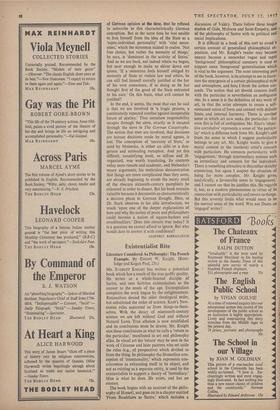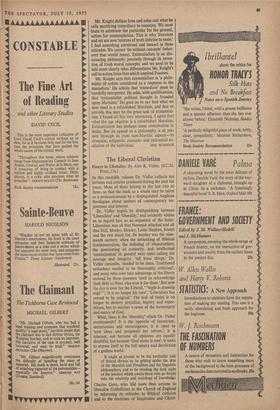Existentialist Bite
MR. EVERETT KNIGHT has written a polemical book which has a touch of the true gadfly quality. He writes as a whole-hearted disciple of Sartre, and sees Sartrian existentialism as the answer to the needs of the age. Existentialism completes the work begun by the enlightenment. Rationalism denied the older theological order, but substituted the order of science. Kant's New- tonian rules separated us from things-in-them- selves. With the decay of nineteenth-century science we are left without God and without Natural Laws. True atheism is now established and its conclusions must be drawn. Mr. Knight sees these conclusions in what he calls a 'return to the particular,' manifested in art and philosophy alike. In visual art the 'return' may be seen in the work of Cezanne and later painters who set aside the rules (e.g., of perspective) which divided us from the thing. In philosophy the Husserlian con- ception of 'intentionality,' which represents con- sciousness as exhausting itself in its object, and not as existing as a separate entity, is used by the existentialists to support a theory of 'immediacy.' Man is what he does. He exists, and has no essence.
The book begins with an account of the philo- sophy of Husserl, and goes on to a chapter entitled 'From Baudelaire to Sartre,' which includes a discussion of Valery. There follow three longer studies of Gide, Malraux and Saint-Exupdry, and of the philosophy of Sartre with its political and social implications.
It is difficult in a book of this sort to avoid a certain amount of generalised philosophical ex- position, and Mr. Knight's reader may become uneasy because a somewhat vague and rapid 'background' philosophical summary is used to support some 'foreground' generalisation which is vital to the argument. The most interesting part of the book, however, is its attempt to see in litera- ture the emergence of a certain philosophical style and atmosphere, and here I think the author suc- ceeds. The notion that art should concern itself with the particular is nevertheless an ambiguous one. In a sense it is the definition of any work of art, in that the artist attempts to create a self- contained union of form and content with definite limits and internal harmony. There is another sense in which art now seeks the particular—but even this is full of ambiguities. Mr. Eliot's 'objec- tive correlative' represents a sense of 'the particu- lar' which is different both from Mr. Knight's and from the sense in which I suggest particularity belongs to any art. Mr. Knight wants to give a moral content to the (modern) artist's concern with particulars. He connects particularity with 'engagement,' through intermediary notions such as immediacy and concern for the individual. There is something attractive in thissather sketchy connection, but again I suspect the situation of being far more complex. Mr. Knight gives, analytically, a favourable sense to 'engagement,' and I cannot see that he justifies this. He regards it, too, as a modern phenomenon in virtue of its connection with particularity and return to things. But this severely limits what would seem to be the normal sense of the word. Was not Dante an 'engaged' writer? Mr. Knight dislikes laws and rules and what he calls sacrificing immediacy to concepts. We must learn to substitute the particular for the general, action for contemplation. This is why literature and art are now 'sources of truth inferior to none.' I find something emotional and inexact in these attitudes. We cannot `do without concepts' (what- ever that would mean). Existentialism is an illu- minating philosophy precisely through its inven- tion of fresh moral concepts; and we need to be told more clearly what differentiates Mr. Knight's call to action from that which inspired Fascism.
Mr. Knight says that existentialism is 'a philo- sophy of action considered as a response to the immediate.' He admits that 'immediate' must be 'carefully interpreted. He adds, with qualifications, that 'existentialist political thought is founded upon Marxism.' He goes on to say that what we now need is a refurbished Marxism, and that to provide this may be the great task of existential- ism. I found all this very interesting. I agree that what the age requires is a refurbished Marxism. Existentialism has perhaps some contribution to make. But its appeal as a philosophy is at pre- sent through its most non-Marxist aspects—its dramatic, solipsistic, romantic and anti-social ex- altation of the individual. IRIS MURDOCII















































 Previous page
Previous page